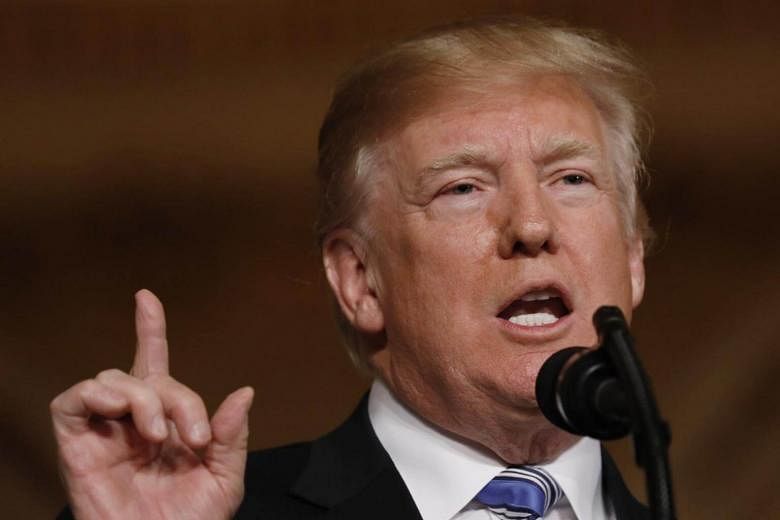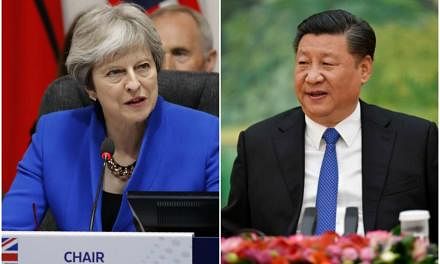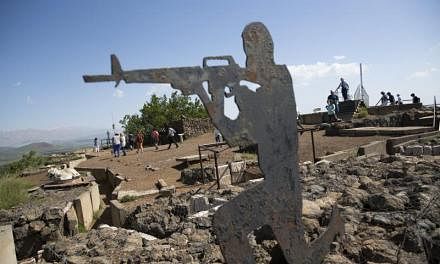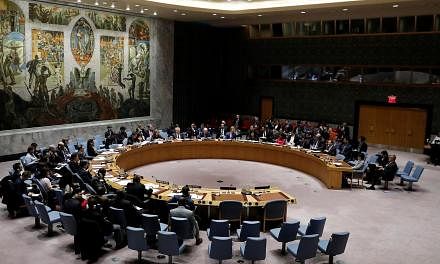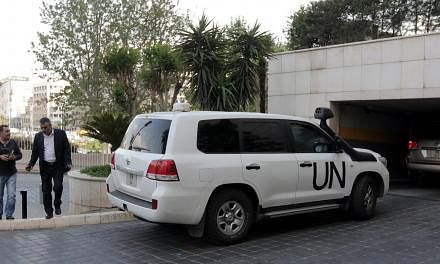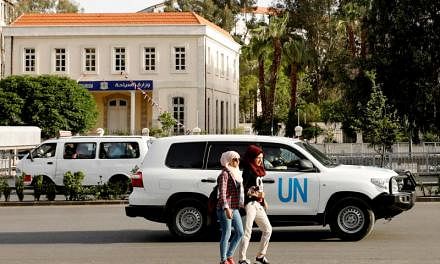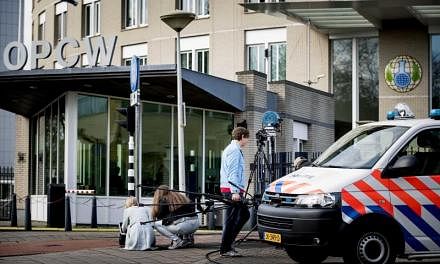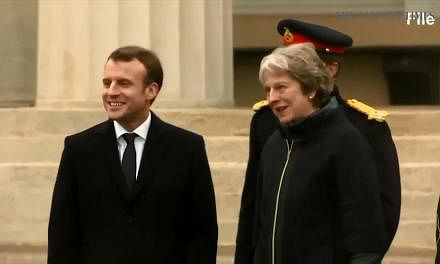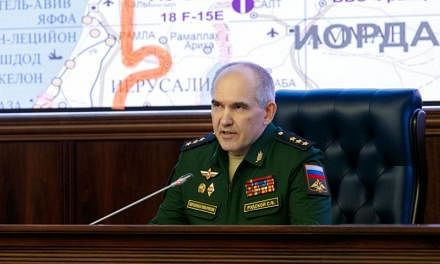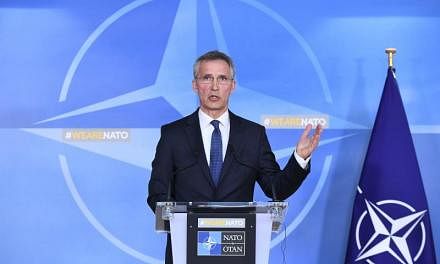WASHINGTON (WASHINGTON POST) - Lawmakers from the US Republican and Democratic parties expressed alarm on Wednesday (April 18) over President Donald Trump's plans to forge ahead with the withdrawal of US troops from Syria, particularly in the absence of what they see as a viable strategy to secure American objectives there.
In a House hearing, members repeatedly challenged the State Department's top officials on the Middle East and Russia to explain how the administration planned to reach its stated goals of defeating the Islamic State in Iraq and Syria (ISIS), building a stable Syria without President Bashar al-Assad, and keeping his Russian and Iranian backers from taking over.
"As tempting as it is to say, 'enough,' and retreat to our shores, smart, focused and determined engagement in the Middle East must be our approach," House Foreign Affairs Committee Chairman Edward Royce, a California Republican, said. "We need to talk strategy with the administration."
Earlier on Wednesday, Senate Foreign Relations Committee Chairman Bob Corker, a Tennessee Republican, said that he was convinced Mr Trump "does plan to leave" Syria despite the advice of many of the President's senior national security aides.
"But I don't see this administration in any way trying to shape what's happening on the ground as it relates to this regime," Mr Corker said at a breakfast hosted by the Christian Science Monitor.
Their comments followed a closed-door military briefing on Tuesday night that left lawmakers "unnerved", according to Senator Lindsey Graham, a South Carolina Republican.
With no military or diplomatic strategy, Mr Graham told reporters, the administration seems willing "to give Syria to Assad, Russia and Iran".
Senator Christopher Coons, a Delaware Democrat, said after the meeting that "the only thing worse than a bad plan on Syria is no plan on Syria, and the President and his administration have failed to deliver a coherent plan on the path forward", CNN reported.
Congressional willingness to speak out, particularly among leading Republicans, follows confusing recent events that have exacerbated long-existing concerns.
To some extent, those concerns began under the previous administration, when President Barack Obama, while voicing support for rebels seeking to oust Mr Assad, declined to provide them with substantial assistance, then failed to follow through on a threat to take military action if Mr Assad used chemical weapons against his own people.
Mr Trump, while campaigning on a promise to end US involvement in overseas wars, doubled down on Mr Obama's separate war against ISIS in both Iraq and Syria, providing the military with broader authorities that have hastened the demise of the militants in both countries.
But while Mr Trump, unlike Mr Obama, has been willing - both last year and again early this month - to use targeted US force to punish and hopefully deter Mr Assad's use of chemical weapons, he faces the same wider dilemma about Syria's future as his predecessor.
Even as the United States and its allies and partners have largely destroyed ISIS' physical caliphate, Mr Assad - with help from Russia and Iran - has decimated the rebels and is close to winning the civil war.
His retention of power, officials in much of the administration and Congress believe, will leave Syria divided, unstable and at risk of a militant resurgence.
At the same time, US allies including Israel and the Persian Gulf states are worried that a Syria with Mr Assad, Moscow and Teheran in control would threaten the security of the entire region.
Until recently, the administration's plan for achieving a different future for Syria was two-fold.
Parts of northern and eastern Syria, liberated from ISIS and under the control of the United States and a proxy force of local Kurdish and Arab fighters, would be stabilised as a bulwark against Mr Assad and his allies and as leverage in political negotiations.
US troops in Syria would remain there to provide security and show that the United States meant business.
Defence Secretary James Mattis had said in November that, "We're going to make sure we set the conditions for a diplomatic solution" to the civil conflict, "... Not just, you know, fight the military part of it and then say good luck on the rest of it."
Mr Trump appeared to undercut that goal in recent weeks when he voiced, to the surprise of many within the administration, plans to withdraw US forces as soon as the last militant remnants are defeated.
In turn, he has solicited military and financial contributions from regional partners, especially among the gulf states, to send troops and pay for stability operations.
While the gulf monarchies are willing to provide financing, and have been reluctant to dismiss troop deployments out of hand, officials and experts in the region have noted that they have little experience or capability of putting together such an operation.
Meanwhile, Mr Trump's willingness to pressure Russia to stop enabling Mr Assad's use of chemical weapons and other atrocities appeared undermined last weekend when the White House indicated that Ms Nikki Haley, the President's ambassador to the United Nations, was mistaken on Sunday when she announced planned new sanctions on Moscow.
Mr Trump personally intervened to put the brakes on the measures to punish Russia for its support of Mr Assad's chemical weapons use.
"After the President personally overrode his own administration's plan to sanction Russia for its support of Assad," Congress needs to press for legislation that would impose new sanctions on both Russia and Iran, Representative Eliot Engel of New York, the ranking Democrat on the Foreign Affairs Committee, said at Wednesday's committee hearing.
"The incoherence is plain to see," Mr Engel said. "I'm not holding my breath, but I continue to hope that the administration will bring us a plan that will push for an end of violence, that will ease political transition and that will help lay the groundwork for a future for Syria in which Bashar al-Assad has no role whatsoever."
Russia controls the only ongoing negotiations over Syria's political future, while the UN-brokered Geneva talks that the United States and its allies back have been stalemated since last year.
UN envoy Staffan de Mistura said on Wednesday he has been conducting "intensive high-level consultations" around the world "with the aim of proactively ascertaining the options for a meaningful relaunch" of the talks.
In committee testimony, Mr A. Wess Mitchell, the US assistant secretary of state for Europe, said that "in the days and weeks ahead, the United States and our allies will degrade and defeat ISIS, support a stable Syria, and limit the spread of Iranian malign influence".
But neither Mr Mitchell, nor Mr David Satterfield, the acting assistant secretary for the Middle East, who sat beside him, provided what members considered a path to achieve those aims.
Lawmakers have met with governments across the Middle East who are concerned about Iranian expansion, Mr Royce said.
What they want to know, he said, was, "Is this going to allow Iran to threaten Jordan, to threaten Israel? Will it mean the end of an independent Lebanon? What will it mean to other partners, allies in the region?"
"What's the strategy?" Mr Royce asked. "What's the strategy, especially in Syria?"
